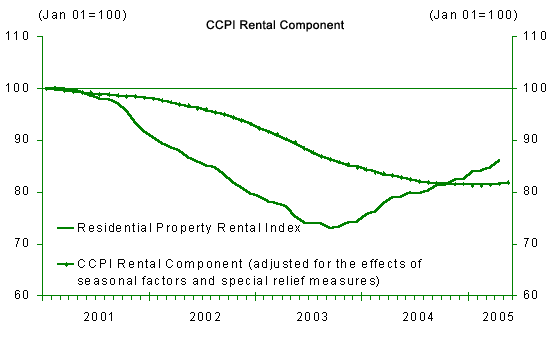During the times of significant movement in consumer prices, whether up or down, discussion about the Linked Exchange Rate system tends to increase.
We all know that the norm for the duration of leases on residential flats is two years. Adjustment of rental before the expiry of the lease is not very common, particularly in the upward direction. So it takes time for the movements of the rental for residential flats, as indicated by new leases, to be reflected in the actual rent paid.
On the basis of available indexes, the declining trend for rentals of residential flats associated with the downturn in the residential property market reversed in the third quarter of 2003, along with the recovery of the economy. The upturn since then has been quite steady: residential rentals over the 19-month period since September 2003 recorded an increase of 18%. However, as can be observed from the attached chart, the declining trend of the rental component of, for example, the Composite Consumer Price Index (CCPI) has only recently shown signs of levelling off. It is to be expected, therefore, that this particular component of the CCPI, which has a 27% weighting in the overall index, will start to show significant increases soon. Other things being equal, the CCPI is likely to show a more definite up-trend in the coming months.
This is not to say that inflation has come back, or that it has been accelerating to such an extent as to justify community or policy concern. Indeed, for the year 2005 as a whole, the Government's forecast is for consumer prices to average 1.5% higher than in 2004. Nevertheless, we all watch with keen interest the movements of consumer prices in Hong Kong, among other economic variables, to help us plan our work more effectively, whatever economic activity we are engaged in.
As far as the HKMA is concerned, we monitor the movements of domestic prices closely because they are relevant to the behaviour of the exchange rate, and we have a responsibility to deliver the monetary policy objective of exchange rate stability determined by the Financial Secretary. Despite our long-standing and continuing commitment to a fixed exchange rate, and the very sound track record of the Linked Exchange Rate system, in periods of significant movements in consumer prices, whether in the upward or downward direction, greater attention is usually paid to the appropriateness or otherwise of the exchange rate regime.
This was the case when Hong Kong experienced recession and deflation. There were calls for allowing the exchange rate to depreciate, in order to enhance competitiveness and, through higher import prices, get deflation out of the system. Ironically, given our commitment to a fixed exchange rate, these calls often had the effect of influencing sentiment in the foreign exchange market to such an extent as to produce a considerable premium on Hong Kong dollar interest rates over those for the US dollar. Monetary conditions became tighter than they needed to be, thus further, and unhelpfully, dampening economic activity.
Similarly, when the economy and the asset markets are doing well, and domestic prices are on the increase, to the extent of arousing concern, there may be calls for freeing up the exchange rate, so that interest rates could be pushed higher, on a discretionary basis, to curb inflation. This would, it may be argued, also lead to an appreciation of the exchange rate, which would be additionally helpful in curbing inflation. We have not heard these arguments yet, although the hot talk about a possible appreciation in the renminbi exchange rate has been affecting sentiment towards the Hong Kong dollar exchange rate for some time now. As a result, there has in the past 18 months been a significant discount on Hong Kong dollar interest rates from those for the US dollar. The consequent easy monetary conditions have thankfully helped the economic recovery that started in the third quarter of 2003 and has been sustained since. But there is always the possibility that, if the easy monetary conditions are sustained for too long, they could become unhelpful, in that they may then begin to contribute to inflation.
While this theoretical, pro-cyclical nature of a fixed exchange rate is something that is not welcome, its adverse effects are likely to be inversely proportional to the credibility of the fixed exchange rate, that is, the more credible it is, the less adverse the effects on prices will be. We are fortunate that the Linked Exchange Rate system enjoys a high degree of credibility both at home and abroad. I believe also that our openness in addressing the issues involved helps to strengthen further the credibility of the system, which explains why I draw attention to the likely outlook for consumer prices, as I see them. And we should remember that alternative regimes have their own limitations. As an international financial centre with no capital controls, Hong Kong encounters large volumes of fund flows. As a result, under a floating regime the exchange rate may frequently overshoot its equilibrium value. A fixed exchange rate, provided that it is credible, offers a useful nominal anchor to deal with changes in fund flows.

Joseph Yam
30 June 2005
Related Viewpoint Articles:
Related Press Release:
Click here for previous articles in this column.
Document in Word format


